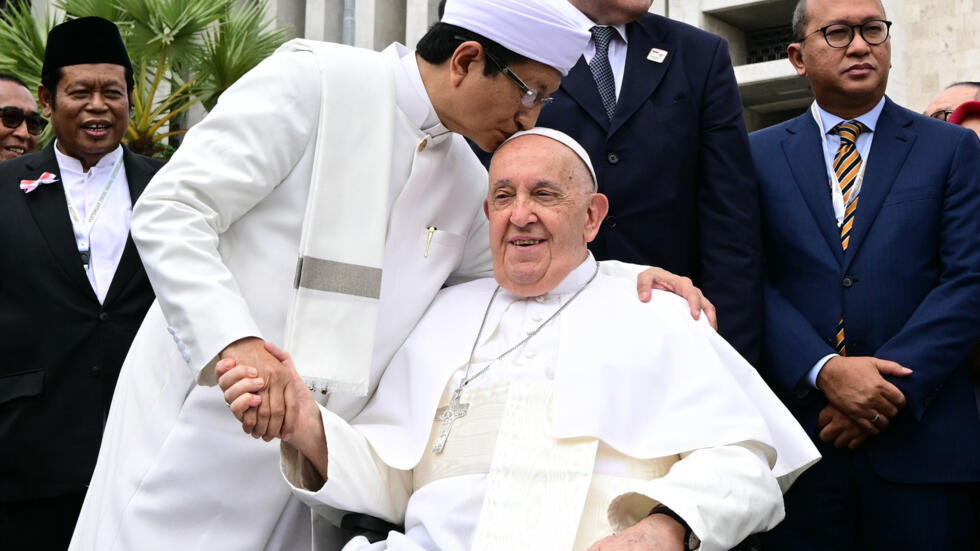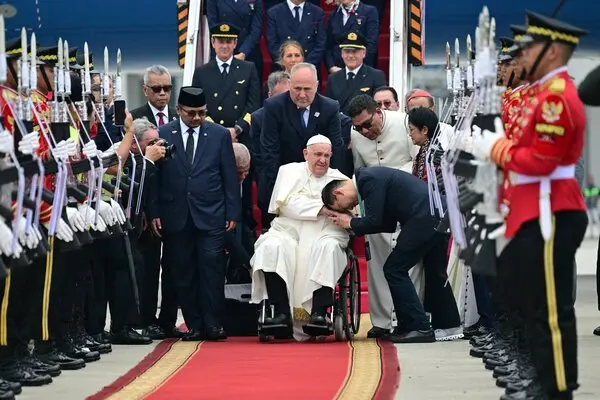
During his apostolic visit to Asia and Oceania, Pope Francis held an interreligious meeting in Jakarta, Indonesia (a country with a large Muslim majority, where there are only 10 % of Christians and 3 % of Catholics), in the Istiqlal Mosque (cf. Speech 5-IX-2024).

The building was designed by a Christian architect and is linked to the Catholic Cathedral of St. Mary of the Assumption by the "tunnel (subway) of friendship." There, Pope Francis praised nobility and harmony in diversityso that Christians can witnessing to their faith in dialogue with great religious and cultural traditions. The motto of his visit was "faith, fraternity, understanding".
Encouraged the Pope Francis believers to continue with the communication - symbolized in that tunnel of friendship- I encourage you to continue on this path: that all of us, the people of the country, will be able to make a difference in the life of the country, all togetherby cultivating one's own spirituality and practicing one's own religion, we can to walk in the search for God and contribute to building open societiesThe "new generations of the Church, founded on mutual respect and mutual love, are capable of isolating rigidities, fundamentalisms and extremisms, which are always dangerous and never justifiable".
In this perspective, Pope Francis wanted to leave them two orientations. First, always see in depth. Because beyond the differences between religions - differences in doctrines, rites and practices - "we could say that the common root of all religious sensibilities is one: the search for an encounter with the divine, the thirst for the infinite that the Most High has placed in our hearts, the search for a greater joy and a life stronger than death, which animates the journey of our lives and impels us to go out of ourselves to meet God".
Pope Francis insisted on what is fundamental: "Looking deeply, perceiving what flows in the most intimate part of our life, the desire for fullness that lives in the depths of our heart, we discover that we are all brothers and sisters, all pilgrims, all on the way to Godbeyond what differentiates us".
In doing so, Pope Francis alluded to one of the key issues of these days: the significance of religions and the dialogue and collaboration between believers (Cfr. Ismatu Ropi, Indonesian Muslim scholar, "Key in Indonesian Interfaith Dialogue," in. Alpha and Omega 12-IX-2024).
A few days later Pope Francis would tell young people in Singapore: "all religions are a path to God". (Meeting13-IX-2024). This is so and it is fulfilled in the religions themselves and to the extent that they respect human dignity and do not oppose the Christian faith. This is not said, therefore, in reference to deformations of religion such as violence, terrorism, Satanism, etc.
On the other hand, Pope Francis also did not affirm that religions are equivalent to each other, or that they have the same value in the Christian perspective (cf. Decl. Nostra Aetate of the Second Vatican Council and the subsequent magisterium, cf. Dominus Iesusof 2000).

In fact, Catholic doctrine teaches that religions, along with elements of truth and goodness, have elements that need to be purified (see also the document of the International Theological Commission), The Christian and religions, 1996).
Secondly, Pope Francis invited to take care of the relationships among believers. Just as a subway passage connects, creates a link, "what really brings us closer is to create a connection between our differences, to cultivate bonds of friendship, of attention, of reciprocity".
Indeed, far from any relativism or syncretism, these links - as previous Popes have also insisted and practiced - "enable us to to work together, to walk together in the pursuit of some objective, in the defense of human dignity.in the fight against poverty, in the promotion of peace. Unity is born of personal bonds of friendship, mutual respect, mutual defense of the spaces and ideas of others".
In other words, it is "promoting religious harmony for the good of humanity"The joint declaration prepared for this occasion is along these lines (cf. Istiqlal joint statement).
"In it we assume with responsibility the great, and sometimes dramatic, crises that threaten the future of humanity, particularly wars and conflicts, unfortunately also fueled by religious instrumentalizations; but also the environmental crisis, which has become an obstacle to the growth and coexistence of peoples.
And against this backdrop, it is important that the values common to all religious traditions be promoted and reinforced, helping society to "eradicate the culture of violence and indifference".
In Papua New Guinea (with a large Christian majority and a quarter of them Catholics), Pope Francis noted upon his arrival in the country: "To all who profess to be Christians," he said upon arriving in the country, "I strongly urge you never to reduce your faith to an observance of rites and precepts, but to make it consist in love, in to love and follow Jesus Christand can become lived cultureinspiring minds and actions, transforming themselves into a beacon of light to illuminate the journey.
In this way, faith will be able to help society as a whole to grow and to find good and effective solutions to its great challenges" (Meeting with the authorities at the APEL Haus, Port Moresby, 7-IX-2024).
In East Timor (where the context is very diverse: a large majority of Catholics), he invited Catholics to take care of their identity first and foremost: "Do not cease to deepen the doctrine of the Gospel, do not fail to mature in the spiritual, catechetical and theological formationbecause all this is necessary for announce the Gospel in this culture of yours and, at the same time, purify it of archaic and sometimes superstitious forms" (Meeting with the Catholic hierarchy and pastoral collaborators in the cathedral of Dili, 10-IX-2024).
"Let us remember," Pope Francis added, "that with the perfumeIn the witness of a coherent Christian life, we must anoint the feet of Christ, which are the feet of our brothers and sisters in the faith, beginning with the poorest of the poor.
The most privileged are the poorest. And with this perfume we have to take care of them. The gesture that the faithful make when they meet you, priests, is eloquent here: they take the consecrated hand and bring it to their foreheads as a sign of blessing" (Ibid.).
Finally, in Singapore (located at the forefront of the economy and material progress, with few Christians, but alive and committed to fraternal dialogue between ethnic groups, cultures and religions) during the Mass he celebrated in the national stadium (Singapore Sports Hub, cf. Homily,12-IX-2024), Pope Francis stressed that. nothing is built without lovealthough some might think that this is a naïve statement.
[This text is a synthetic version of the one that will be published in the journal Omnes, October 2024].
Mr. Ramiro Pellitero Iglesias, Professor of Pastoral Theology at the Faculty of Theology of the University of Navarra.
Published in Church and new evangelization.